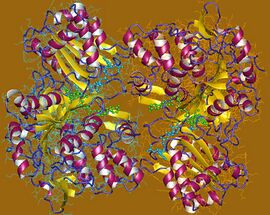Biology:NADPH—hemoprotein reductase
| NADPH—hemoprotein reductase | |||||||||
|---|---|---|---|---|---|---|---|---|---|
 NADPH-Cytochrome P450 reductase dimer, Rattus norvegicus | |||||||||
| Identifiers | |||||||||
| EC number | 1.6.2.4 | ||||||||
| CAS number | 9023-03-4 | ||||||||
| Databases | |||||||||
| IntEnz | IntEnz view | ||||||||
| BRENDA | BRENDA entry | ||||||||
| ExPASy | NiceZyme view | ||||||||
| KEGG | KEGG entry | ||||||||
| MetaCyc | metabolic pathway | ||||||||
| PRIAM | profile | ||||||||
| PDB structures | RCSB PDB PDBe PDBsum | ||||||||
| Gene Ontology | AmiGO / QuickGO | ||||||||
| |||||||||
In enzymology, a NADPH—hemoprotein reductase is an enzyme that catalyzes the chemical reaction
- NADPH + H+ + n oxidized hemoprotein [math]\displaystyle{ \rightleftharpoons }[/math] NADP+ + n reduced hemoprotein
The 3 substrates of this enzyme are NADPH, H+, and oxidized hemoprotein, whereas its two products are NADP+ and reduced hemoprotein. It has 2 cofactors: FAD, and FMN.
This enzyme belongs to the family of oxidoreductases, specifically those acting on NADH or NADPH with a heme protein as acceptor. The systematic name of this enzyme class is NADPH:hemoprotein oxidoreductase. Other names include cytochrome P450 reductase, ferrihemoprotein P-450 reductase, and NADPH-dependent cytochrome c reductase.
Structural studies
As of late 2007, 10 structures have been solved for this class of enzymes, with PDB accession codes 1AMO, 1B1C, 1J9Z, 1JA0, 1JA1, 1YQO, 1YQP, 2BF4, 2BN4, and 2BPO.
References
- "The enzymatic reduction of cytochrome c, cytochrome c reductase". J. Biol. Chem. 136: 747–774. 1940. doi:10.1016/S0021-9258(18)73034-2.
- Horecker BL (1950). "Triphosphopyridine nucleotide-cytochrome c reductase in liver". J. Biol. Chem. 183 (2): 593–605. doi:10.1016/S0021-9258(19)51185-1.
- "Resolution of the cytochrome P-450-containing omega-hydroxylation system of liver microsomes into three components". J. Biol. Chem. 244 (13): 3714–21. 1969. doi:10.1016/S0021-9258(18)83427-5. PMID 4389465.
- "Studies on the Mechanism of Microsomal Triphosphopyridine Nucleotide-Cytochrome C Reductase". J. Biol. Chem. 240 (2): 921–31. 1965. doi:10.1016/S0021-9258(17)45262-8. PMID 14275154.
- WILLIAMS CH Jr; KAMIN H (1962). "Microsomal triphosphopyridine nucleotide-cytochrome c reductase of liver". J. Biol. Chem. 237 (2): 587–95. doi:10.1016/S0021-9258(18)93967-0. PMID 14007123.
- "The mechanism of 1- and 2-electron transfers catalyzed by reduced triphosphopyridine nucleotide-cytochrome c reductase". J. Biol. Chem. 240 (10): 4081–8. 1965. doi:10.1016/S0021-9258(18)97152-8. PMID 4378860.
- "NADPH-P-450 reductase: structural and functional comparisons of the eukaryotic and prokaryotic isoforms". Biochimie 77 (7–8): 562–72. 1995. doi:10.1016/0300-9084(96)88172-7. PMID 8589067.
- "Three-dimensional structure of NADPH-cytochrome P450 reductase: prototype for FMN- and FAD-containing enzymes". Proc. Natl. Acad. Sci. U.S.A. 94 (16): 8411–6. 1997. doi:10.1073/pnas.94.16.8411. PMID 9237990. Bibcode: 1997PNAS...94.8411W.
- "Determination of the redox properties of human NADPH-cytochrome P450 reductase". Biochemistry 40 (7): 1956–63. 2001. doi:10.1021/bi001718u. PMID 11329262.
- "Determination of the redox properties of human NADPH-cytochrome P450 reductase". Biochemistry 40 (7): 1956–63. 2001. doi:10.1021/bi001718u. PMID 11329262.
- Scrutton NS; Grunau, A; Paine, M; Munro, AW; Wolf, CR; Roberts, GC; Scrutton, NS (2003). "Electron transfer in human cytochrome P450 reductase". Biochem. Soc. Trans. 31 (Pt 3): 497–501. doi:10.1042/BST0310497. PMID 12773143.
- Scrutton NS; Grunau, A; Paine, M; Munro, AW; Wolf, CR; Roberts, GC; Scrutton, NS (2003). "Electron transfer in human cytochrome P450 reductase". Biochem. Soc. Trans. 31 (Pt 3): 497–501. doi:10.1042/BST0310497. PMID 12773143.
 |

